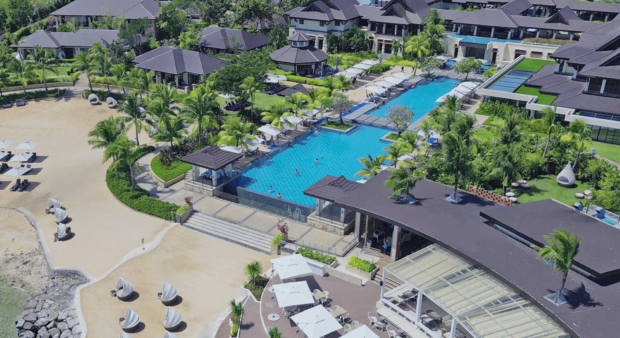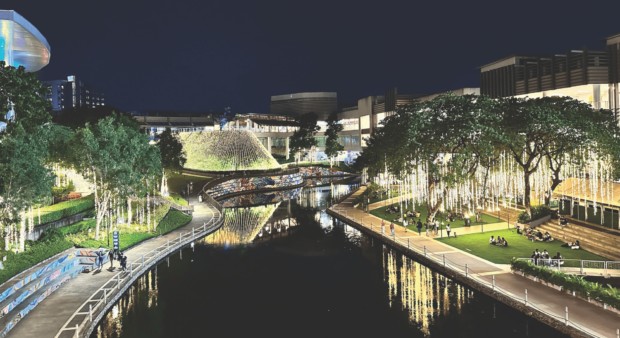You don’t realize how much energy Christmas takes out of you until you’ve gotten on in age. The season, particularly long as it is in our particularly merry case, ushered in by the first of nine dawn Masses (misa de gallo) before Christmas Day and shown out at the end of New Year week, feels even longer with each passing year. Surely you’ve noticed carols playing in department stores earlier and earlier—actually, every commercially exploitable season is made to run onto the next so that the year becomes one continuous marketing season.
I think I heard my first carol of 2014 in August, and when I did I felt an automatic drag of anticipation on my residual energy, and wondered if I could keep the proper spirit up until the year was over. I did manage, but not without effort and an impatience for a return to, by my time-constrained standards, more exciting business.
But that will yet have to give way to something even the most jaded among us should be glad to concede: The Pope is visiting in the third week of the New Year, at the heels of the Three Kings, a perfect excuse to get on with the merrymaking and stretch Christmas ever longer.
Impatient as I am, therefore, for certain things freezered during Christmas to thaw, get warm, then get hot again, I’m more than willing to wait; indeed, I’m looking forward to being re-inspired and re-energized by Francis. Not that I need any of that to be able to follow his visit, but I’ll certainly need it for my own general sake and, more immediately, to be able to remain patient amid all the compulsive posteriorizing—the summing up, the analyzing—that the media will launch themselves into after the visit, delaying further my return to my exciting life.
And if you haven’t yet guessed what I’m impatient for, you’re not likely among the irrepressible civic number—79 percent of the nation—who demand answers to today’s most critical political questions, questions that revolve around the political season’s most controversial personage, the man who would himself be president, if the trend holds—Jejomar Binay.
Enough is enough?
To be sure, the senate committee investigating Binay gave assurances upon taking its Christmas break that it would resume its investigation. But I myself have caught out-of-season voices—few but forthcoming and indulged—escaping into the airwaves, saying that enough is enough, that other issues deserve more to be heard than Binay.
Obviously, for all their insistence on being seen as disinterested yet savvy, they have ignored the 79 percent going against them—they style themselves as “political analysts,” and look down on the others, however numerous and no matter if reliably polled, as mere onlookers.
Surely, their title alone cannot carry the day for them. “Political analyst” is a description now routinely applied to precisely anyone given the opportunity to open his mouth publicly and air his view of political goings-on. Apparently intended to leave as much impression of gravity as words by themselves can, “political analyst” has replaced the plainer-sounding “political observer.” But air padding easily gives itself away—it doesn’t hold, it puffs.
And the flatulence becomes spectacular when, as not seldom happens, the political analysis comes from someone who himself retains political clients and runs electoral campaigns. Their words naturally carrying a fee, how can these be any use to a nonpaying listener? But then, how does he know? The media themselves are no help; they do lump all political analysts together, and in television the indiscriminateness seems the worst: The title just lies there for the taking. Political operators may have their own place in the public discourse, but it’s only fair that they concede their biases before joining in.
The concession, at any rate, is scarcely needed in Binay’s case: Anyone who suggests that, having spent too much time looking into it, the Senate should now stop and let the courts take over is not only crazy to challenge an impregnable wall of popular opposition, but also in denial of the implication patently built into it—that nearly eight in ten Filipinos think the charges against Binay credible enough to deserve an answer from him. So far he has done nothing more than play a broken record repudiating them as mere “political demolition.”
Multifarious
Binay’s case, moreover, is so comprehensive it could well serve as mother of all cases: It collects enough of the sociocultural ills that have plagued this society—dynasty, corruption, patronage, cronyism and, of course, their multifarious complications.
No family has a stronger or broader hold on official power. Jejomar, the patriarch, is vice president himself and leads all presidential hopefuls for 2016; his junior is mayor of the nation’s richest city, Makati; a daughter is in the Senate, and another in the Lower House of Congress.
Elenita the matriarch has played her own dynastic role, inserting herself as mayor of Makati while her husband, having served his three-term limit, took the term-long break prescribed by law before he could become eligible for reclaiming the mayoralty—and rewarming the seat for his son.
His sights already set on the presidency even before he became vice president, Jejomar Binay began building a network of sister cities across the country with Makati, his family’s political franchise, as the nucleus. For that he is now accused of patronage funding.
Cronies, meanwhile, have begun to blow the whistle on him and his family. He, his wife and their son are accused of profiting, during their turns as mayor, from rigged and overpriced projects. Further whistle-blowing is supposedly forthcoming.
But my own excitement has to do less with the Binay case per se than the openness of the Senate hearings of it; that’s why I will have no political analyst telling me enough is enough. Having given up my ringside press seat on public affairs upon retirement, I have television to thank for a substitute privilege, for showing me the whole run of the inquiry while I sit or lie on a couch in home comfort, although, like the 79 percent, I still wish Binay were there.
But don’t get me wrong. I have not exactly become so shortsighted and self-interested in seniorhood. I do feel for the nation at large as well, indeed never happier to share a rich democratic privilege: No course in politics and civics has been more instructive—it’s immediately relevant, it’s live, and it’s raw and pure, undefrauded by political analysis.












































